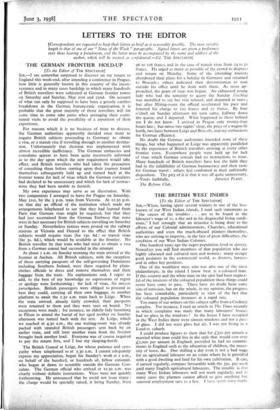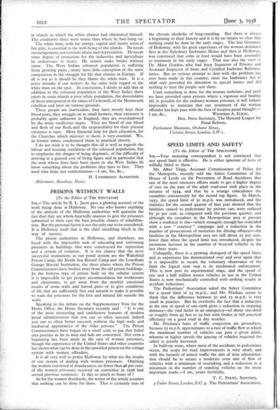THE BRITISH WEST INDIES
[To the Editor of THE SPECTATOR] SIR,—When, having spent several winters in one of the less- known of our West Indian islands, I read such statements as " the causes of the troubles . . . are to be found in the labourer's wage of is. a day and in his disgraceful living condi- tions," I feel strongly that an injustice is being done to the efforts of our Colonial administrators, Churches, educational authorities and even the much-abused planters themselves, who are striving to improve, in the face of great difficulties, the condition of our West Indian Colonies.
One hundred years ago the negro population lived in slavery. Nowadays you will find members of that population who are highly educated and cultured men and women; many occupy good positions in the commercial world, as doctors, lawyers and in other key positions.
One of the wealthiest men, who was also one of the most philanthropic, in the island I know best is a coloured man.
If this country and the white man on the spot had been neglect- ful of the interests of the coloured population these things could never have come to pass. There have no doubt been some sins of omission, but on the whole, in my opinion, the progress has been remarkable, particularly in view of the fact that the coloured population increases at a rapid rate.
Too many of our writers on this subject suffer from a Cockney complex. For instance, I read an article in The Times recently in which complaint was made that many labourers' houses had no glass in the windows ! In the house I have occupied in the West Indies there were sixteen windows and not a pan: of glass. I did not want glass but air, I was not living in a London suburb.
I could produce figures to show that for £350 per annum a
married white man could live in the style that would cost over £2,000 per annum in England, provided he had no commit- ments in England such as the education of children, the neces- sity of leave, &c. One shilling a day even is not a bad wage for an agricultural labourer on an estate where he is provided with a good dwelling and land for his own cultivation. It can, if earned regularly, compare favourably with the 35s. per week paid many English agricultural labourers. The trouble is that many West Indian labourers will not work regularly, and in many cases the planters cannot afford to give anything but seasonal employment save to a few. I have spent some weeks
in islands in which the white planter had eliminated himself. The conditions there were worse than where he had hung on.
The white man, with his energy, capital and innate sense of fair play, is essential to the well-being of the islands. He needs encouragement, not constant abuse and depreciation. He needs some degree of protection for the industries and agriculture he endeavours to foster. He cannot make bricks without straw. The West Indian coloured population is suffering from growing pains ; many have little conception of the stern competition in the struggle for life that obtains in Europe. If all is not as it should be they blame the white man. It is a grave mistake if our writers do the same with regard to the white man on the spot. In conclusion, I desire to add that in addition to the coloured population of the West Indies there exists in some islands a poor white population, the descendants of those transported at the times of Cromwell, of the Monmouth rebellion and later on various grounds.
These people are inarticulate, they have mostly kept their blood pure, they struggle on as small farmers, their existence is probably quite unknown in England, they are overshadowed by the more vociferous negro. They are blood of our blood and flesh of our flesh, and the responsibility for their present existence is ours. More financial help for their education, for the Churches which minister to them, is very essential. We, in former times, condemned them to practical slavery.
I do not wish it to be thought that all is well as regards the labour and housing conditions of the coloured population, but to emphasise the danger of being dogmatic, of the difficulty of arriving at a general cost of living figure and in particular that the men whose lives have been spent in the West Indies do know something about the problems they have to face. They need wise help, not condemnation.—I am, Sir, &c.,
Aldermoor, Beaulieu, Hants.
H. LETHBRIDGE ALEXANDER.



















































 Previous page
Previous page